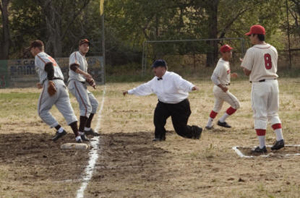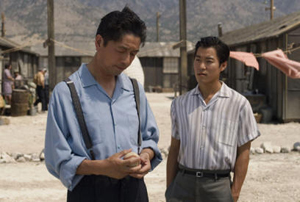Special to The Asian Reporter
Baseball is fondly referred to as the "American pastime," but it was not always so. For more than 50 years, the game systematically excluded non-white players, with the exception of a handful of sufficiently light-skinned Native Americans and Latinos. Not many people think of Asians as members of this excluded group, but they too weren’t allowed to participate in this most American of pastimes.
Asian baseball integration might have happened sooner, were it not for Pearl Harbor, World War II, and the furious anti-Japanese backlash that resulted. In one of the most shameful episodes in U.S. history, these Japanese-American families were rounded up, forced to sell their businesses and homes, and shipped off to "internment camps," where they would be prevented from espionage and sabotage activities. Stripped of their possessions — but not their dignity — these internees struggled to live normal lives in the camps, often playing baseball. Few could have missed the irony of these supposedly dangerous "foreigners" finding solace in this quintessentially American game.
Desmond Nakano’s 2007 film, American Pastime, sets out to tell these stories, showing how these internees managed to embrace the culture that rejected them, while still retaining their pride and occasional moments of triumph. The movie follows the Nomura family, whose patriarch Kaz (Masatoshi Nakamura) once played semipro ball in the all-Japanese league that existed before the war, occasionally defeating a barnstorming team of white major leaguers in exhibition games. Although Kaz never made the big leagues because of his ancestry, his son Lyle (Aaron Yoo) is a star pitcher at UCLA, and — as he is shown dancing with his well-integrated group of friends — we wonder if he won’t accomplish what his father could not.
Then comes Pearl Harbor and the Nomura family’s resulting internment at the Topaz Camp in the Utah desert. As all the families struggle with the austerity of their living conditions as well as the suppurating racism from the nearby town, the villains of the movie make their entrance. Billy Burrell (Gary Cole) is the military commander at Topaz and a minor league baseball player still hoping to make it to the New York Yankees. His harsh treatment of the inmates only increases when his son is killed in the Pacific. He finds a ready anti-Japanese ally in Ed Tully (Jon Gries), his minor-league teammate and the town barber, and both grumble disconsolately at the few freedoms allowed to the internees.
The stage is set for the inevitable confrontations of the movie: Lyle meets Billy’s daughter Katie (Sarah Drew) and they fall in love. Billy’s superior, much more sympathetic to the plight of the internees, suggests a baseball game between the camp and Billy’s local squad. And Lyle’s older brother Lane (Leonardo Nam) enlists in the Fighting 442nd, the all-Japanese regiment that would become the most decorated in U.S. history. Though Lyle and his mother don’t understand why Lane would want to fight for the country that treated his family like potential traitors, Lane receives his father’s blessing and leaves for Europe.
Lane’s enlistment further divides the camp from the town and gives the Topaz baseball team extra incentive to beat Burrell’s minor-league squad. The baseball action at the heart of the movie does not last long, but it provides the requisite excitement and a chance for the internees to defeat the town bullies.
The game features commentary by real major-leaguer John Kruk, in the darkly funny role of a racist ballpark announcer continually deriding the Topaz squad. True to its symbolic nature, which is apparent even to the Topaz internees, the game needs only to trace the outlines of the conflict raging within the hearts and minds of both its Japanese and white participants.
Like other baseball films, American Pastime is not so much a sports movie as an allegory for life, with the requisite winners, losers, heroes, and villains. Well-acted and crisply directed, this film is not a grim Schindler’s List or Sophie’s Choice. It is a far more palatable way for anyone to understand the gross injustices perpetrated on Japanese Americans by both baseball and the country that created it. Ever a useful metaphor for the battles of life, the baseball diamond is framed by white lines that stretch from home to infinity, dividing fair from foul with the clarity that only a child’s game can provide. If American Pastime seems to cleave the world too easily into these same rigid categories, it is only because the game that occupies its heart does too.
American Pastime is now available on DVD. To learn more, visit <www.warnervideo.com/americanpastime>.
|




